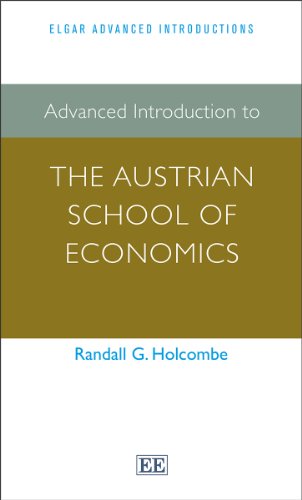

Most ebook files are in PDF format, so you can easily read them using various software such as Foxit Reader or directly on the Google Chrome browser.
Some ebook files are released by publishers in other formats such as .awz, .mobi, .epub, .fb2, etc. You may need to install specific software to read these formats on mobile/PC, such as Calibre.
Please read the tutorial at this link: https://ebookbell.com/faq
We offer FREE conversion to the popular formats you request; however, this may take some time. Therefore, right after payment, please email us, and we will try to provide the service as quickly as possible.
For some exceptional file formats or broken links (if any), please refrain from opening any disputes. Instead, email us first, and we will try to assist within a maximum of 6 hours.
EbookBell Team

5.0
80 reviews'Randy Holcombe's Advanced Introduction to the Austrian School of Economics is a comprehensive and extremely readable introduction to the main ideas of this school of economic thought. Holcombe uses plenty of everyday examples and common sense wisdom to explain often esoteric sounding doctrines in very plain language. The result is an exemplar in clear thinking and clear writing. Ultimately, there is only 'good' economics and 'bad' economics. Holcombe demonstrates throughout this book why the common sense economics of Menger, Böhm-Bawerk, Mises, Hayek, Kirzner and Rothbard is part of the great lineage of 'good' economics, and how these ideas have a powerful and continuing relevance to science, scholarship, policy, and a broader world view about how the world works.'
- Peter J. Boettke, George Mason University, US
'I have become increasingly aware that, more times than not, mainstream economists who have an opinion about Austrian economics got that opinion from the critics of the Austrian school. This circumstance makes Randy Holcombe's insightful, refreshing and upbeat 'Advanced Introduction' an especially welcome addition to the Austrian literature.'
- Roger W. Garrison, Auburn University, US
Erudite, accessible and lucidly written, this book provides both a stimulating introduction and excellent summary of the core principles, ideas and diversity of modern Austrian economics. The Austrian school was well within the mainstream of economic thought by the 1930s, but fell from prominence by the middle of the twentieth century. There was a renewed interest in the Austrian school s ideas beginning in the 1970s which has accelerated recently, but many economists do not have a good understanding of the distinguishing values and characteristics that set it apart. This volume is aimed at readers who already have a familiarity with economic analysis, but would like to know more about the distinct philosophies of the Austrian school. The book succinctly but thoroughly covers all the major issues including:
- the market process decentralized knowledge and the role of firms and markets
- economic calculation
- money, banking and business cycles
- the resurgence of the Austrian school.
Contents: Preface 1. The Market Process 2. Decentralized Knowledge: The Role of Firms and Markets 3. Economic Calculation 4. Money, Banking, and Business Cycles 5. The Resurgence of the Austrian School References Index